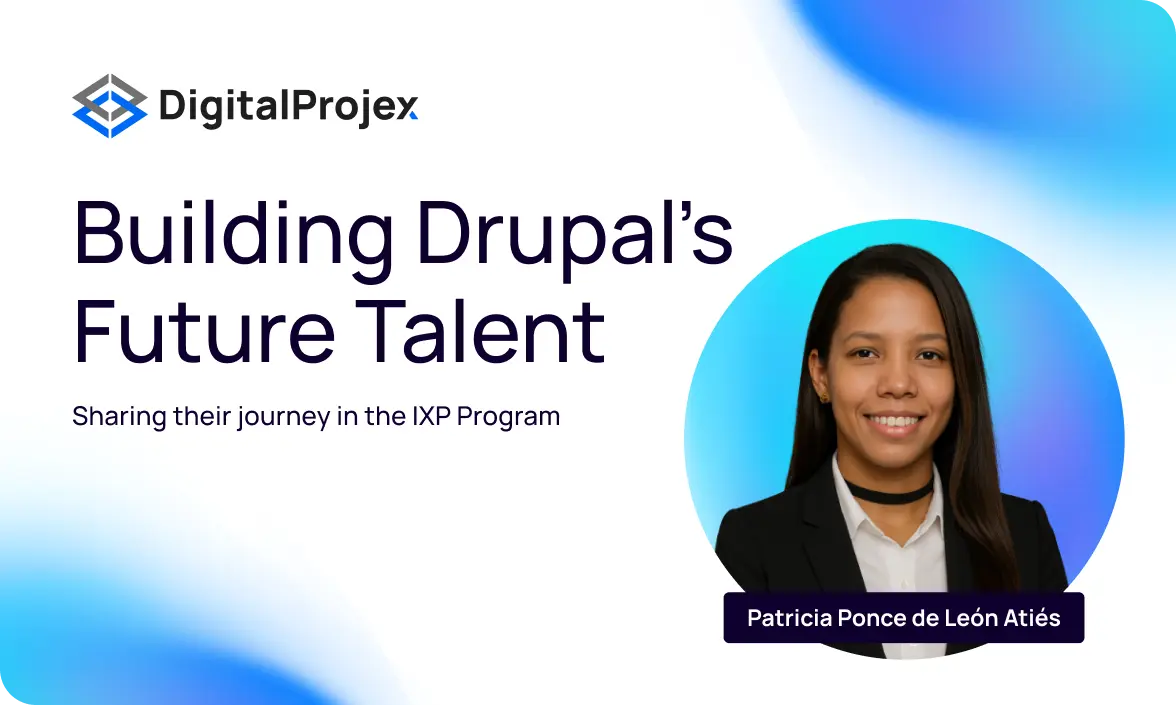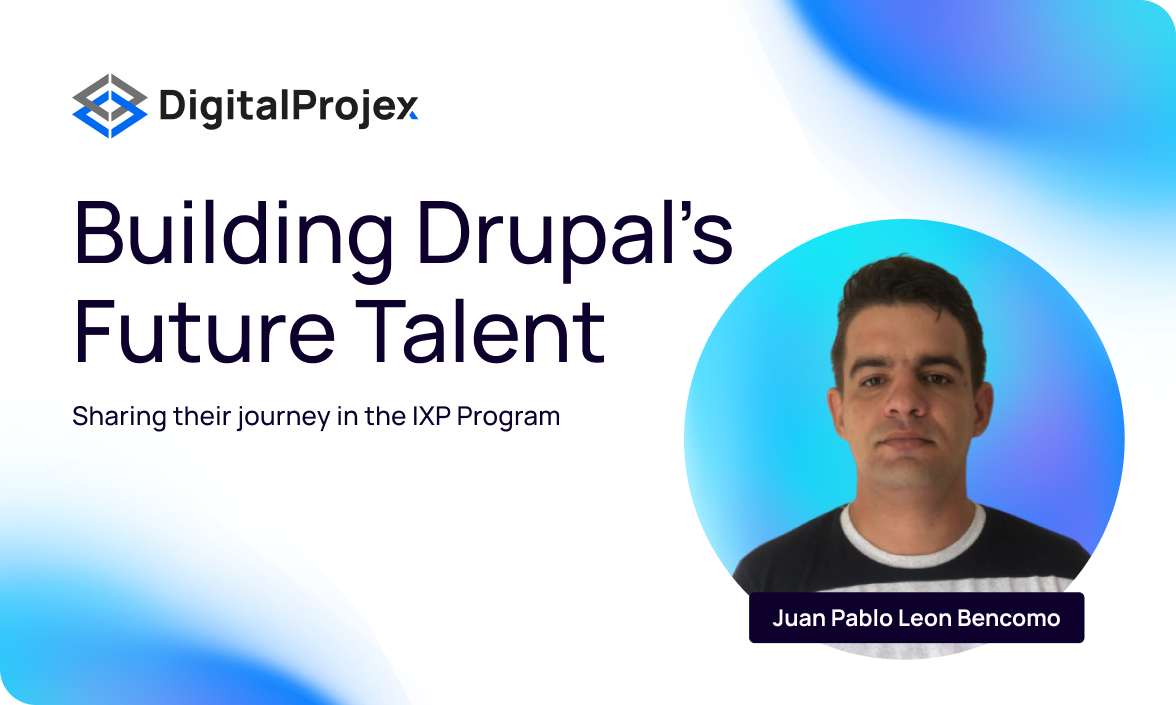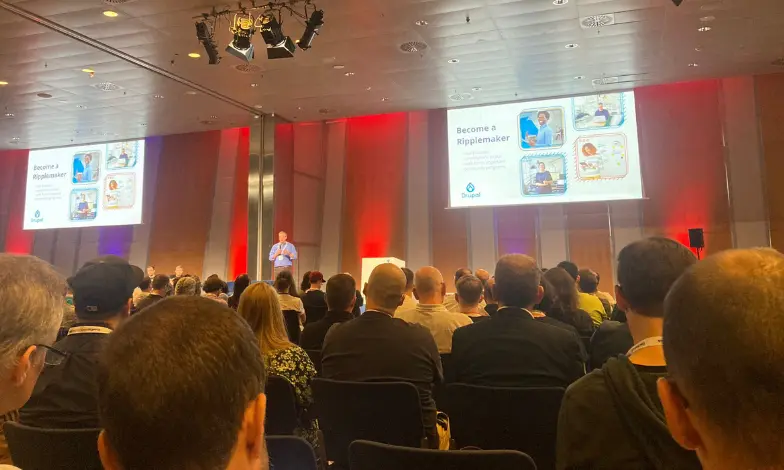5 min - Drupal
IXP program: a journey of learning and professional evolution
Published on Aug 27, 2025

Hello, my name is Patricia, and I hold a degree in Computer Science Engineering. During my studies, I built a foundation in programming and gained knowledge of PHP, HTML, CSS, and JavaScript. In my professional career, I reinforced these skills and focused on learning a CMS. Among the many options, I chose WordPress because its learning curve was simpler.
As I specialized, I began looking for other alternatives. I often came across posts mentioning Drupal, but I never dared to learn it until the opportunity arose to do so dynamically—linked to real projects and with compensation. This opportunity seemed excellent and exactly what I needed, since hands-on practice and the motivation of being part of a real project drive learning. Today, I want to share my experience in the IXP program and how it boosted my career in the world of software development.
As a WordPress developer, my job opportunities were limited only to that CMS, because most other CMS or framework roles required at least one year (or more) of demonstrable experience. Lacking that experience, I often felt I couldn’t meet those expectations, so I confined myself to what I already knew, without leaving my comfort zone.
Thanks to a former colleague connected with DigitalProjex, I had the chance to apply with my existing skills to a paid mentorship for Drupal. After several interviews, I was accepted into the IXP mentorship program, created my user account, and joined the company to begin.
From the start, I had a mentor who evaluated my skills and set clear learning goals for Drupal. Thanks to my foundation in PHP and WordPress, and the similarities between both, I progressed faster than expected and gained confidence. Still, there were differences that required extra effort, such as working with Twig (templates) and Drupal structures like text formats, block types, and configuration export/import.
This opportunity was ideal to expand my knowledge and grow in web development. It was especially attractive because I could gain new skills, receive guidance from a mentor, and be part of a Drupal-experienced company, all while being compensated during the learning process.
At first, I felt nervous, thinking the learning would be more complex, but as I advanced—with the help of my colleagues—I became more confident and realized I could achieve much more. The mentorship lasted three months, during which I had constant support from my mentor, who helped me integrate into the team and the tasks. The assignments ranged from simple to complex, ensuring my learning curve was not too steep and helping me fully integrate into the company’s workflow.
I worked on a real project for a company responsible for digitalizing public services. The project had a solid multisite structure with several custom modules. At first, my mentor mapped out a learning path I had to follow before joining the team, which included Site Builder and Backend Developer courses that gave me the foundation needed to handle a real-world environment.
My first task was to understand the project’s structure, which was complex due to uncommon Drupal concepts and customizations. I set up the system locally using DDEV and received support from several team members, who explained custom commands, the site leveling process, and basic configurations of a multisite setup and the overall project architecture.
One of the most difficult tasks was solving a permissions issue when creating a custom container. I had to study the project’s structure, understand the container-based layout builder, and learn how each site worked, including its roles, permissions, and connection to the parent site. I also had to take into account profiles and specific sites with unique configurations. Additionally, I learned how to assign permissions to these containers and developed an update hook for sites that already had containers installed but lacked the proper permissions.
As part of the mentorship, we were also taught how to contribute to Drupal.org: creating issues and comments, downloading and updating code with Drupal’s Git, and making merge requests. I also participated as a contributor by resolving assigned issues, receiving feedback, and managing several issues in other projects until they were successfully resolved.
During this stage, I learned about workflows using Daily to communicate progress and issues, and I used tools for task and time tracking, as well as project management. I implemented a solution to log time per story and task, which made it easier to visualize effort and allocate resources in complex projects. I also configured my IDE to follow coding standards, ensuring the codebase was easily maintainable, and applied my learning in both Site Builder and Backend Developer tracks prepared by my mentor.
As I progressed through the mentorship, I acquired new skills and applied theoretical knowledge. I learned to use PHPCS to align my code with Drupal standards and maintain consistency across the project. In the beginning, I often had to backtrack to reinforce concepts, as I hadn’t fully mastered them yet.
My communication also improved significantly: at first, shyness held me back from expressing my opinions, but over time—attending daily meetings and working in a collaborative environment—I integrated better into the team.
One of my first tasks was exporting configurations to load them into a custom module using the updb command. Although I thought it would be complex, it turned out to be easier with practice, which helped me better understand real use cases of configuration export.
In the beginning, I felt insecure about my tasks and even hesitant to ask for help unless the problem seemed really difficult. But as the mentorship went on and I participated in meetings, I gained more confidence. While I needed guidance at first, later I was able to analyze situations on my own, find solutions, and then present them to my mentor for feedback and improvements.
I always received feedback from my mentor on each task. Many times, he would guide me with comments like: “You could check this” or “I think the issue might be here.” After presenting a solution, we would review the code together, and he would help me optimize it. This feedback was key to improving my skills.
Today, I work as a Drupal web developer at DigitalProjex, maintaining projects and developing new functionalities as needed. After participating in several projects, I’ve gained the confidence to face challenges and solve problems, supported by a team ready to provide advice and guidance.
During the mentorship, I learned Drupal dynamically through real projects, improved my coding with standardization tools, and understood workflows that optimize organization. I strengthened my communication skills and learned the importance of asking questions, especially when you have a supportive team.
The mentorship accelerated my growth in Drupal because I always had the help I needed. Without the team’s collaboration, learning would have taken me much longer. Their experience and recommendations helped me avoid mistakes and find simpler solutions. Today, I feel confident taking on new tasks and challenges. I also contribute back by writing internal articles for new Drupal learners and collaborating in team communication channels to solve doubts.
This experience was invaluable for me: it changed my approach to learning and to work, encouraged me to apply for roles without waiting for the “perfect moment,” helped me trust my abilities, and taught me to value teamwork.
For those just starting, I know fear can hold you back from joining a program like this—I’ve been there. I doubted whether my knowledge was enough for the mentorship, but once I began, those insecurities disappeared. I grew more confident in myself and in my team.
I believe you don’t need to meet all requirements right away—you should move step by step. The most important thing is the desire to learn, improve, and step out of your comfort zone. Often, fear prevents us from realizing what we’re capable of until we take the leap.
This mentorship experience exceeded my expectations. I want to thank DigitalProjex for the opportunity and for welcoming me into their team. A special thanks to my mentor for guiding me and sharing invaluable feedback.
If you’re starting out with Drupal, remember: nobody begins knowing everything—the key is to take small steps forward. If you ever get the chance to join this mentorship, take it. It changed my path, and it could be the push you need too.
Need consulting services to create a recipe for your company?
Contact Us
Related Posts
-

From Beginner to Contributor: A Journey of Growth Through the IXP Program
Juan Pablo León shares his experience in the Drupal IXP program at DigitalProjex, where he went from having a basic understanding of CMS to developing real projects.
Learn more -

DigitalProjex leaves its mark at Florida DrupalCamp 2025
DigitalProjex participated in Florida DrupalCamp, which took place from February 21 to 23, 2025.
Learn more -

DigitalProjex at DrupalCon Barcelona 2024
Digitalprojex shares its experience at DrupalCon Barcelona 2024
Learn more

